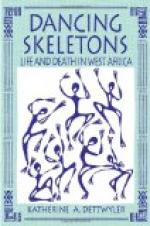|
This section contains 1,327 words (approx. 5 pages at 300 words per page) |

|
The First Historians and Teachers. Long before the eighth century, when Muslim scholars began writing histories of West Africa in Arabic, the ancient kingdoms of West Africa relied on the oral tradition to pass on their histories. These accounts of villages and clans and genealogies of ruling families were kept by people now known as griots, a French word meaning "traditional minstrel," which probably replaced African words such as dieli in the Bambara language. Griots served as oral historians, storytellers, poets, dancers, musicians, and actors, teaching the clan its history and keeping the memories of their people. Each clan or village had its own griot. Royal families often hired griots to preserve their personal stories and events of their dynasty. According to an ancient Soninke epic, the first griot known by name was Gassire, who composed a praise song...
|
This section contains 1,327 words (approx. 5 pages at 300 words per page) |

|




